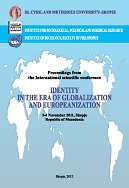
MULTICULTURALISM VS INTERCULTURALISM: FROM AN INDIVIDUAL (SUBJECTIVE) VIEWPOINT
In general, when a man is in the conglomerate of different cultural facts surrounding him and if he has at any occasion to be inclined to some of them – within the socio–cultural space where he belongs – it is appropriate to find that they have to follow, rather, the result of an individual effort, of an autonomous individual, than to be instructed from above, say, by the institutions of the community, by the state. That would concern not only the possible choices done on this occasion, but the volume (level) in which they would be adopted and so on, so the real dramatis personae on that road would be properly thought out and educated individuals. Then, we have to arrive to an acceptable solution by foreseeing, on the one hand, the educational contents that would apply to all individuals, and then point them out, in principle, and the ways in which such an individual chooses the value of orders for himself.
More...